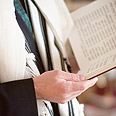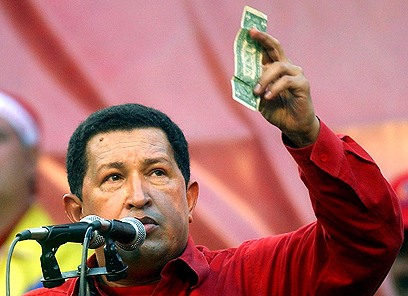
Venezuelan Jews: New year, new home
Jewish community in Miami suburb of Aventura resembles very much one Jews left behind in Caracas, after fleeing government of late President Chavez. 'We passed the tradition from there to here,' one of them says as she prepares for Rosh Hashana
This year the customs were quite similar: She attended service at the synagogue Wednesday to bring in the Jewish New Year and then hosted a big dinner for more than two dozen relatives.
The only difference: They celebrated in the Miami suburb of Aventura, where thousands of Jewish Venezuelans have settled after fleeing the government of the late President Hugo Chavez, who was outspoken in his opposition to Israel.
"We passed the tradition from there to here," Hausmann, a mother of three, said as she prepared her shopping list Tuesday.
The Jewish community here now resembles very much the one Hausmann and others left behind in Caracas. Life centers around the busy Michael-Ann Russell Jewish Community Center, where talk in Spanish fills the halls; and at the nearby Sky Lake Synagogue, where a once aging Jewish population has been replaced by a younger, 83% Latino membership, most from Venezuela.
Even the bat mitzvahs, coming-of-age ceremonies for young Jewish girls, are organized like those in Venezuela.
The numbers vary, but most experts agree about half of the Jewish population in Venezuela or more has fled in the past decade. At one point the Jewish community in the South American country was as large as 25,000; it numbers about 9,000 today.
'The fiber of the community turned around'
Like other Venezuelans, some members of the Jewish population emigrated due to economic and political insecurity and high crime rates. But Jews in Venezuela also faced intensified hostility as Chavez led campaigns against Israel, accusing the Israeli government of genocide against the Palestinians.
In 2009, the largest synagogue in Caracas was vandalized, and a database with names and addresses stolen. The words, "Jews, get out" were spray-painted against the walls. A columnist posted a call to action on a pro-government website, calling Jews "squalid" and demanding protests and boycotts of Jewish-owned businesses, as well as the seizure of Jewish-owned property.
"Publicly challenge every Jew that you find in the street, shopping center or park," wrote the columnist, Emilio Silva.
Chavez denied inciting religious intolerance, but Venezuelan Jewish leaders, the Organization of American States and the US State Department said the president's harsh criticism of Israel inspired a growing number of hate crimes.

Hugo Chavez. Denied inciting religious intolerance (Photo: AP)
Most Venezuelan immigrants have settled in South Florida, which now claims the largest population of Venezuelans in the United States. But unlike many gentile Venezuelans, who have remade communities such as Doral and Weston with restaurants and businesses that echo the country they left behind, Jewish families chose North Miami Beach and Aventura, where there were already synagogues and Jewish schools and centers.
There were also many gated, single-home communities in Aventura that attracted families escaping violence in Venezuela, notes Rabbi Ariel Yeshurun, head of the Sky Lake Synagogue.
Sky Lake Synagogue was established in the late 1960s by Jews of mostly Eastern European decent. Fifty years later, the population was aging and their numbers dwindling. Sky Lake was on the verge of shutting down – until Chavez became president.
The synagogue now regularly has standing room only during high holiday services and most members are between 35 and 55 years of age.
"It just really changed," Yeshurun said. "The fiber of the community turned around."
Acceptance of individuality
At the Michael-Ann Russell Jewish Community Center a few miles away, the demographics have shifted through the years in accordance with Latin American politics. There was an influx of Argentine Jews during that country's economic crisis from 1999 to 2002, many of whom arrived without jobs and got their first helping hand at the center.
The center holds its own rendition of the Maccabi Games, an international Jewish athletic event held in Israel. Teams are divided by country of origin, with the 600-member Venezuelan team forming the largest, and the US following with about 350 members.
There used to be a separate team representing Cubans, but so many members of the Cuban community have assimilated that they are now just part of the US team.
"We're not trying to create a melting pot," said the center's executive director, Gary Bomzer. "Rather, it's an acceptance of individuality."
The number of adult Hispanic Jews in the US now totals more than 60,000, according to a population study published this year by the Berman Jewish Databank, a project of The Jewish Federation of North America. The largest number, 51,600, reside in New York, but Miami is where they constitute the largest percent of the Jewish population: 10.3%. In New York, it is 4.3%.
"It's a population that certainly has grown in the past 20 years, in a pretty significant way," said Ira Sheskin, chair of the Department of Geography and Regional Studies at the University of Miami and principal investigator of the 2013 report.
Jews began arriving in Latin America as early as the 15th century, when Sephardic Jews were outcast from Spain. In the past two centuries, they have fled persecution in Europe.
Argentina and Brazil have some of the largest Jewish populations. In Venezuela, their numbers are smaller but there is a well-organized system of Jewish day schools, community centers and synagogues in the capital of Caracas. It's that structure that Venezuelan Jews have tried to replicate in Aventura.
Hausmann, who was born in Colombia but married a Venezuelan and lived for years in Caracas, left seven years ago, seeking a more stable environment for her children. Her oldest daughter, now 13, recently celebrated her bat mitzvah almost exactly as she would have in Venezuela: She did not read from the Torah during the ceremony, unlike most US-born Jewish girls.
The Hausmanns also attend services at Sky Lake Synagogue.
"When I go there, I feel like I would in Colombia," Hausmann said. "My husband feels like he's in Venezuela."
The transition to life in the US, though eased by the support of the Jewish community, has not been simple: Hausmann was only recently able to obtain her residency, and her husband has had to travel back and forth for work.
"But at least you're safe," she said.
High holiday celebrations take a bit more effort: Family members flew in from Colombia and Venezuela for the feast at Hausmann's house. She estimated there would be 33 on hand Wednesday evening.
On the menu, though, was a taste of what they left behind and what they have preserved: Sweet food to usher in blessings for the new year, and sour dishes to help keep out the bad.










